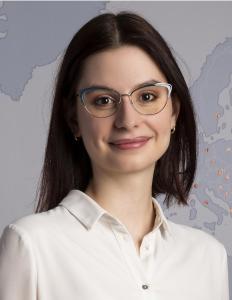Study visit focused on various topics including German foreign and security policy and its significant transformation of relations with Russia in reaction to its war against Ukraine, but also German-Chinese relations including foreign investments in China. From the broader regional point of view, assistants were interested in German perspective on developments in German politics in last two years and Slovakia (after recent elections) in connection to democratic backsliding and importance of rule of law. As for the more domestic perspective, discussions also dealt with energy transition, German defence policy, migration policy and support for populist movements in Germany and Europe.
We have started the first day of the visit with a briefing at the Embassy of the Czech Republic in Berlin. Discussion hosted by Martin Žáček built upon the introductory debate focused on German political landscape with Zuzana Lizcová from the Charles University and Šárka Strahalová from the Ministry of Foreign Affairs of the Czech Republic that already took place one week before visit of Berlin. After the briefing, the assistants were joined by Czechs working for members of Bundestag for a networking event.
On the second day a follow-up discussion with German assistants to members of Bundestag took place, while topics included energy security and renewable sources, security issues (mainly hybrid threats and defence policy), and reform of EU institutions, further differentiation, and the rule of law (especially focusing on the V4). These subjects were discussed from both Czech and German perspective with a purpose of exchanging experiences and best practice.
After the visit to Bundestag the journey to Potsdam followed as the Czech assistants visited Berlin-Brandenburgische Auslandsgesellschaft (BBAG) e.V., which focuses, among other topics, on working with migrants, and discussed the process of integrating foreigners in practice. The debate with Claudia Dombrowsky, Monika Kadur, Fadia Foda and Eric Mbiakeu covered the practical side of the process itself, but also other important factors and specific nuances of migrant integration in Germany. These included issues such as the problems of migrant isolation, which leads to social bubbles, or the recognition of a profession from the country of origin by the German labour market, and how it could potentially benefit from the work of foreigners.
The last day of the visit started at the German Federal Foreign Office with another briefing on Czech-German relations and German policy towards Central Europe. The Czech delegation was joined by officer for the Czech Republic and officers from various departments, including division for bilateral relations to Central Eastern Europe, EU reform and rule of law, but also those dealing with European Migration Policies. The debate once again focused on exchange between two countries resulting in recognition of importance of Czech Republic as a strong and reliable partner in the region.
Last but not least, we visited the Zentrum Liberale Moderne where we have discussed with Nicole Jundt and Christina Russmann the topic of "Russian Germans" in relation to the issue of misinformation and integration, but we also looked at the overall historical context of this part of German society.



